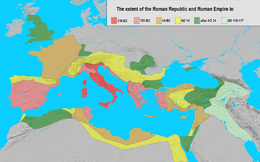218 BC
Year 218 BC was a year of the pre-Julian Roman calendar. At the time it was known as the Year of the Consulship of Scipio and Longus (or, less frequently, year 536 Ab urbe condita). The denomination 218 BC for this year has been used since the early medieval period, when the Anno Domini calendar era became the prevalent method in Europe for naming years.
| Millennium: | 1st millennium BC |
|---|---|
| Centuries: | |
| Decades: | |
| Years: |
| 218 BC by topic |
| Politics |
|---|
| Categories |
|
| Gregorian calendar | 218 BC CCXVII BC |
| Ab urbe condita | 536 |
| Ancient Egypt era | XXXIII dynasty, 106 |
| - Pharaoh | Ptolemy IV Philopator, 4 |
| Ancient Greek era | 140th Olympiad, year 3 |
| Assyrian calendar | 4533 |
| Balinese saka calendar | N/A |
| Bengali calendar | −810 |
| Berber calendar | 733 |
| Buddhist calendar | 327 |
| Burmese calendar | −855 |
| Byzantine calendar | 5291–5292 |
| Chinese calendar | 壬午年 (Water Horse) 2479 or 2419 — to — 癸未年 (Water Goat) 2480 or 2420 |
| Coptic calendar | −501 – −500 |
| Discordian calendar | 949 |
| Ethiopian calendar | −225 – −224 |
| Hebrew calendar | 3543–3544 |
| Hindu calendars | |
| - Vikram Samvat | −161 – −160 |
| - Shaka Samvat | N/A |
| - Kali Yuga | 2883–2884 |
| Holocene calendar | 9783 |
| Iranian calendar | 839 BP – 838 BP |
| Islamic calendar | 865 BH – 864 BH |
| Javanese calendar | N/A |
| Julian calendar | N/A |
| Korean calendar | 2116 |
| Minguo calendar | 2129 before ROC 民前2129年 |
| Nanakshahi calendar | −1685 |
| Seleucid era | 94/95 AG |
| Thai solar calendar | 325–326 |
| Tibetan calendar | 阳水马年 (male Water-Horse) −91 or −472 or −1244 — to — 阴水羊年 (female Water-Goat) −90 or −471 or −1243 |
The Roman republic in 218 BC (all colours except white and blue).

The Roman empire in 218 BC (in dark red)
Events
By place
Carthage
- A Carthaginian army under Hannibal attacks Rome's Spanish allies. Roman inactivity encourages Hannibal to embark on a daring campaign: the conquest of Spain as far north as the Pyrenees, a clear violation of the Ebro River treaty of the First Punic War. Hasdrubal, the second son of Hamilcar Barca, is left in command of Spain when his brother Hannibal begins his campaign.
- Hannibal sets out with around 40,000 men and 50 elephants from New Carthage (Cartagena) to northern Spain and then into the Pyrenees where his army meets with stiff resistance from the Pyrenean tribes. This opposition and the desertion of some of his Spanish troops greatly diminishes his numbers, but he reaches the Rhône River facing little resistance from the tribes of southern Gaul.
- After crossing the Rhône River and meeting with friendly Gallic leaders headed by the northern Italian Boii, whose knowledge of the Alpine passes are of assistance to Hannibal, the Carthaginians cross the Durance River. Hannibal's army approaches the Alps either by the Col de Grimone or the Col de Cabre, then through the basin of the Durance descending into the territory of the hostile Taurini, where Hannibal storms their chief town (modern Turin).
Roman Republic
- A Roman army under the consul Publius Cornelius Scipio is transported by sea to Massilia (modern Marseille) to prevent Hannibal from advancing on Italy. As Scipio moves northward along the right bank of the Rhône, he learns that Hannibal has already crossed the river. Realizing that Hannibal probably plans to cross the Alps, Scipio returns to northern Italy to await him. However, he still sends an army into Spain under his elder brother Gnaeus Cornelius Scipio Calvus to deal with the Carthaginian forces still there.
- A second Roman army, under the other consul, Tiberius Sempronius Longus, assembles in Sicily to embark for Northern Africa. Longus managed to capture Malta from the Carthaginians.[1]
- A Roman army under Scipio rushes to the Po River to protect the recently founded Roman colonies of Placentia (modern Piacenza) and Cremona. Hannibal's forces meet the army of Scipio on the plains west of the Ticino River in the Battle of Ticinus, and Hannibal's Numidian cavalry prevails over the Romans. Scipio is severely wounded, and the Romans withdraw to Placentia.
- The Roman Senate, appalled by the early setback at Ticinus, orders Tiberius Sempronius Longus to travel from Sicily to reinforce Publius Cornelius Scipio's troops.
- December 18 – The combined Roman armies under Tiberius Sempronius Longus and Scipio meet Hannibal on the left bank of the Trebia River south of Placentia and are soundly defeated in the Battle of the Trebia.
- Hannibal's victory over the Romans brings both the Gauls and the Ligurians to Hannibal's side, so his army is considerably augmented by Celtic recruits.
Seleucid Empire
- Negotiations between the new Egyptian King Ptolemy IV and the Seleucid King Antiochus III collapse, and Antiochus III renews his advance, overrunning Ptolemy's forward defences. Antiochus III gains territory in Lebanon, Palestine and Phoenicia.
Births
Deaths
gollark: Also, didn't you say test cases were to be released this time, übq?
gollark: Too bad, this is apioform.
gollark: Around "space character".
gollark: You have a stray `.
gollark: This is unethical.
References
| Wikimedia Commons has media related to 218 BC. |
- Castillo, Dennis Angelo (2006). The Maltese Cross: A Strategic History of Malta. Greenwood Publishing Group. pp. 20–26. ISBN 9780313323294.
This article is issued from Wikipedia. The text is licensed under Creative Commons - Attribution - Sharealike. Additional terms may apply for the media files.